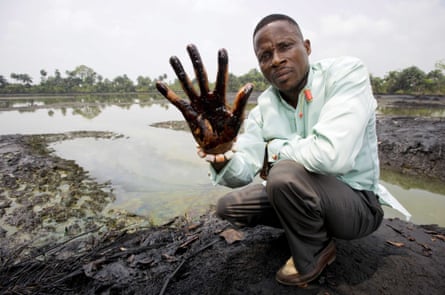Latest from the Commission
1st June 2022
On 10 October 2004, Eric Dooh received an urgent call from one of his father’s employees: the waterway surrounding their houses was running black with oil. Near the outskirts of Dooh’s village of Goi, a pipeline built by Royal Dutch Shell in the 1960s carried oil from inland Nigeria to an offshore terminal where it would be barreled and exported around the world. Dooh suspected the pipeline had sprung a leak. He attempted to alert the pipeline operator, but both Shell and its Nigerian subsidiary had largely abandoned oil operations in Goi a decade earlier in response to local uprisings. On that day, Shell’s community relations officer was unavailable, Dooh recalled. He reported the leak to a nearby police station instead.
It wasn’t until the next day that officials climbed onboard a helicopter, ascended over Dooh’s village situated on the banks of the Oroberekiri Creek in Nigeria’s southern Niger Delta region, and confirmed what villagers already knew: oil was spreading and not letting up.
Later that day, the situation in Goi went from bad to worse. Oil spilled into a local farmer’s house and connected with a cooking fire. The village, its oil-seeped creek and the surrounding mangrove forests erupted into flames.

On 12 October a team of investigators – made up of locals, government officials, and employees for Shell’s Nigerian offshoot, Shell Petroleum Development Company – located the source of the leak: an 18-inch hole in an exposed portion of the pipeline. They temporarily plugged the split pipeline with wood chips and later sealed it with a clamp, but over the course of the three-day leak, the operators never shut off the flow of oil at its source. By then, more than 23,000 litres of oil had spilled and nearly 40 acres of mangrove forest had burned, poisoning the land and fishponds that were the lifeblood of the village.
Shell would later argue in court that locals brought the disaster upon themselves; the leak was the work of saboteurs, they claimed. Vandalism and theft are common in the region, but so too is old and abandoned pipeline infrastructure that’s prone to leaks. Dooh and his father, Barizaa, who was the chief of their village, attested the oil spill was the result of a poorly maintained pipeline.
Two years dragged by before government agencies began clean-up efforts around Goi. “We were eating, drinking, breathing the oil,” Dooh said. By 2010, six years after the initial leak, Goi was still too polluted to sustain its residents. The Nigerian government ordered them to abandon their homes and permanently evacuate Goi. By then, most of the villagers, including the Dooh family, had already moved away, scattered across nearby towns.


Today, the oil industry in Nigeria faces a reckoning with Shell at the helm. According to Amnesty International, the oil company has come under “unprecedented legal scrutiny” in recent years for its negligent and criminal practices in the Niger Delta. Several lawsuits are ongoing while others have culminated in courts ordering Shell to pay plaintiffs billions of dollars in damages. The mounting pressure has Shell considering a rapid departure from the region’s oil market. In early August 2021, the company announced it would sell off all remaining onshore oilfields in Nigeria, citing challenges with community unrest, sabotage and a company-wide refocus on promoting green energy. But locals and lawyers see the move as Shell ducking its responsibility to clean up after itself. A court in March barred Shell from selling any more assets in Nigeria while the company appeals against a ruling in which it was found liable for a 2019 oil spill and ordered to pay affected communities nearly $2bn in damages.
“It is incomprehensible to imagine that if these spills and this level of pollution occurred in North America or Europe that it would be allowed to happen,” said Mark Dummett, the director of Amnesty International’s global issues programme.

Dooh and his neighbors were among the hundreds of thousands of Niger Delta residents who had suffered from spills in the half century after Shell discovered oil in the region. Dooh and his father set out to put an end to the industry’s legacy of environmental pollution, corporate greed and human rights abuses. But seeking justice and compensation for their losses was not for the faint of heart. For one, they would be going up against a multibillion-dollar, multinational conglomerate with a team of experienced lawyers at their disposal. Then there was fear of arrest and reprisal. Government security forces provided security for oil companies and often responded violently to protests and uprisings against oil pollution. In 1995, the Nigerian government hanged nine environmental activists, who became known as the Ogoni Nine, named for the Indigenous Ogoni people, who spoke out against Shell’s pollution.
Accountability was hard to come by. But Dooh and his family had lost everything: their village, their thriving chicken farm and bakery, their fishponds and livelihoods. They wanted Shell to pay.
Source: The Guardian
